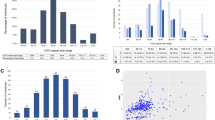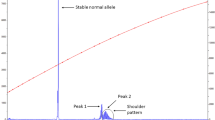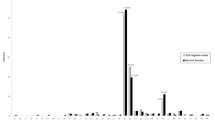Abstract
Introduction
The CGG repeats in the 5′ untranslated region of the fragile X mental retardation 1 gene (FMR1) gene shows increased instability upon maternal transmission. Maternal FMR1 intermediate (45–54 repeats) and premutation (PM: 55–<200 repeats) alleles usually expand to full mutation (>200 repeats) alleles in offspring and consequently, cause fragile X syndrome (FXS) in them.
Methods
In a prospective cohort study, Pakistani pregnant women in prenatal care were first screened for FMR1 expanded alleles. In the follow-up, pregnancy outcomes in women carrying FMR1 expanded alleles were recorded and their newborn offspring were also screened for FXS.
Results
In a total of 1950 pregnant women, 89 (4.6%) were detected carriers for FMR1 expanded alleles; however, rates of detection of expanded alleles were found significantly high in women with a history of FXS. In addition, miscarriages and birth of affected newborns with FXS were significantly more common in women carrying large size PM alleles and had a history of FXS (P = 0.0494 and P = 0.0494, respectively).
Conclusions
The current study provides the first evidence of screening Pakistani pregnant women for FMR1 expanded alleles in prenatal care. Moreover, the miscarriage was also detected as a clinical predictor for FXS.
Impact
-
Offspring would have a higher risk of developing FXS due to maternal FMR1 alleles expansions during transmission.
-
This is the first prospective cohort study in Pakistan for finding FMR1 allelic status of pregnant women and their newborn offspring in follow-up.
-
The robust offspring risk for FXS estimated in this study may be valuable information for genetic counseling of women carriers for FMR1 expanded alleles.
-
The family history and miscarriage were detected as effective indicators for FXS carrier screening in Pakistani women.
Similar content being viewed by others
Log in or create a free account to read this content
Gain free access to this article, as well as selected content from this journal and more on nature.com
or
Data availability
All the data used to support the findings of this study are included within the article and are available on request from the corresponding author.
References
Hagerman, R. J. & Hagerman, P. J. Fragile X Syndrome: Diagnosis, Treatment, and Research (Taylor & Francis US, 2002).
Omar, H. A. H., Kamal, T. M., Abd-Alkhalek, H. S., El Nady, G. H. & Salem, M. Molecular characterization of X chromosome fragility in idiopathic mental retardation. Egyptian. J. Med. Hum. Genet. 17, 165–172 (2016).
Wheeler, A., Raspa, M., Bishop, E. & Bailey, D. Jr Aggression in fragile X syndrome. J. Intellect. Disabil. Res. 60, 113–125 (2016).
Brackett, D. M. et al. FMR1 transcript isoforms: association with polyribosomes; regional and developmental expression in mouse brain. PloS One 8, e58296 (2013).
Alvarez-Mora, M. I. et al. Paternal transmission of a FMR1 full mutation allele. Am. J. Med. Genet. Part A 173, 2795–2797 (2017).
Hunter, J. et al. Epidemiology of fragile X syndrome: a systematic review and meta‐analysis. Am. J. Med. Genet. Part A 164, 1648–1658 (2014).
Madrigal, I. et al. Intermediate FMR1 alleles and cognitive and/or behavioural phenotypes. Eur. J. Hum. Genet. 19, 921–923 (2011).
Nolin, S. L. et al. Expansion of the fragile X CGG repeat in females with premutation or intermediate alleles. Am. J. Hum. Genet. 72, 454–464 (2003).
Tejada, M.-I., et al. Molecular testing for fragile X: analysis of 5062 tests from 1105 fragile X families—performed in 12 clinical laboratories in spain. Biomed. Res. Int. 2014, 195793 (2014).
Jacquemont, S. et al. Epigenetic modification of the FMR1 gene in fragile X syndrome is associated with differential response to the mGluR5 antagonist AFQ056. Sci. Transl. Med. 3, 64ra1–64ra1 (2011).
Villate, O. et al. Effect of AGG interruptions on FMR1 maternal transmissions. Front. Mol. Biosci. 7, 135 (2020).
Fernandez-Carvajal, I. et al. Screening for expanded alleles of the FMR1 gene in blood spots from newborn males in a Spanish population. J. Mol. Diagnostics 11, 324–329 (2009).
Seneca, S. et al. Evaluation of a CGG repeat primed PCR system designed for detection of Fragile X expanded alleles in clinical prenatal samples. Abstract book of the 12th Annual Meeting of the Belgian Society of Human Genetics (2012).
Hung, C.-C. et al. Fragile X syndrome carrier screening in pregnant women in Chinese Han population. Sci. Rep. 9, 1–7 (2019).
Musci, T. J. & Caughey, A. B. Cost-effectiveness analysis of prenatal population-based fragile X carrier screening. Am. J. Obstet. Gynecol. 189, S117 (2003).
Niu, M. et al. Fragile X syndrome: prevalence, treatment, and prevention in China. Front. Neurol. 8, 254 (2017).
Kidd, S. A. et al. Fragile X syndrome: a review of associated medical problems. Pediatrics 134, 995–1005 (2014).
Cheng, Y. K. et al. Identification of fragile X pre-mutation carriers in the Chinese obstetric population using a robust FMR1 polymerase chain reaction assay: implications for screening and prenatal diagnosis. Hong. Kong Med J. 23, 110–116 (2017).
Johansen Taber, K., Lim‐Harashima, J., Naemi, H. & Goldberg, J. Fragile X syndrome carrier screening accompanied by genetic consultation has clinical utility in populations beyond those recommended by guidelines. Mol. Genet. Genom. Med. 7, e1024 (2019).
Genetics, G. C. ACOG Committee opinion no. 469: carrier screening for fragile X syndrome. Obstet. Gynecol. 116, 1008–1010 (2010).
Cronister, A., DiMaio, M., Mahoney, M. J., Donnenfeld, A. E. & Hallam, S. Fragile X syndrome carrier screening in the prenatal genetic counseling setting. Genet. Med. 7, 246–250 (2005).
Nolin, S. L. et al. Fragile X full mutation expansions are inhibited by one or more AGG interruptions in premutation carriers. Genet. Med. 17, 358–364 (2015).
Tassone, F., Pan, R., Amiri, K., Taylor, A. K. & Hagerman, P. J. A rapid polymerase chain reaction-based screening method for identification of all expanded alleles of the fragile X (FMR1) gene in newborn and high-risk populations. J. Mol. Diagnostics 10, 43–49 (2008).
Todorov, T., Todorova, A., Georgieva, B. & Mitev, V. A unified rapid PCR method for detection of normal and expanded trinucleotide alleles of CAG repeats in huntington chorea and CGG repeats in fragile X syndrome. Mol. Biotechnol. 45, 150–154 (2010).
Campbell, I. Chi‐squared and Fisher–Irwin tests of two‐by‐two tables with small sample recommendations. Stat. Med. 26, 3661–3675 (2007).
Richardson, J. The analysis of 2×2 contingency tables-yet again. Stat. Med. 30, 890 (2011). author reply 891-2.
Wheeler, A., Raspa, M., Hagerman, R., Mailick, M. & Riley, C. Implications of the FMR1 premutation for children, adolescents, adults, and their families. Pediatrics 139(Supplement 3), S172–S182 (2017).
Ma, Y. et al. The prevalence of CGG repeat expansion mutation in FMR1 gene in the northern Chinese women of reproductive age. BMC Med. Genet. 20, 1–5 (2019).
Sherman, S., Pletcher, B. A. & Driscoll, D. A. Fragile X syndrome: diagnostic and carrier testing. Genet. Med. 7, 584–587 (2005).
Rajendra, K., Bringman, J. J., Ward, J. & Phillips, O. P. Who should be tested for fragile X carriership? A review of 1 center’s pedigrees. Am. J. Obstet. Gynecol. 198, e51–e53 (2008).
Toledano-Alhadef, H. et al. Fragile-X carrier screening and the prevalence of premutation and full-mutation carriers in Israel. Am. J. Hum. Genet. 69, 351–360 (2001).
Fanos, J. H., Spangner, K. A. & Musci, T. J. Attitudes toward prenatal screening and testing for Fragile X. Genet. Med. 8, 129–133 (2006).
Acharya, K. & Ross, L. F. Fragile X screening: attitudes of genetic health professionals. Am. J. Med. Genet. Part A 149, 626–632 (2009).
Taber, K. A. J. et al. Clinical utility of expanded carrier screening: results-guided actionability and outcomes. Genet. Med. 21, 1041–1048 (2019).
Jang, J. H. et al. Frequency of FMR1 premutation carriers and rate of expansion to full mutation in a retrospective diagnostic FMR1 Korean sample. Clin. Genet. 85, 441–445 (2014).
Levesque, S. et al. Screening and instability of FMR1 alleles in a prospective sample of 24,449 mother–newborn pairs from the general population. Clin. Genet. 76, 511–523 (2009).
Seltzer, M. M. et al. Prevalence of CGG expansions of the FMR1 gene in a US population‐based sample. Am. J. Med. Genet. Part B: Neuropsychiatr. Genet. 159, 589–597 (2012).
Metcalfe, S. A. et al. Informed decision making and psychosocial outcomes in pregnant and nonpregnant women offered population fragile X carrier screening. Genet. Med. 19, 1346–1355 (2017).
Kraan, C. M. et al. FMR1 allele size distribution in 35,000 males and females: a comparison of developmental delay and general population cohorts. Genet. Med. 20, 1627–1634 (2018).
Berkenstadt, M., Ries‐Levavi, L., Cuckle, H., Peleg, L. & Barkai, G. Preconceptional and prenatal screening for fragile X syndrome: experience with 40 000 tests. Prenat. Diagn. 27, 991–994 (2007).
Alfaro Arenas, R., Rosell Andreo, J. & Heine Suñer, D. Islands, GftsoFitB. Fragile X syndrome screening in pregnant women and women planning pregnancy shows a remarkably high FMR1 premutation prevalence in the Balearic Islands. Am. J. Med. Genet. Part B: Neuropsychiatr. Genet. 171, 1023–1031 (2016).
Ryynänen, M. et al. Feasibility and acceptance of screening for fragile X mutations in low-risk pregnancies. Eur. J. Hum. Genet. 7, 212–216 (1999).
Nolin, S. L. et al. Fragile X AGG analysis provides new risk predictions for 45–69 repeat alleles. Am. J. Med. Genet. Part A 161, 771–778 (2013).
Capelli, L. P., Mingroni-Netto, R. C. & Vianna-Morgante, A. M. Structure and stability upon maternal transmission of common and intermediate FMR1 (Fragile X Mental Retardation 1) alleles in a sample of the Brazilian population. Genet. Mol. Biol. 28, 10–15 (2005).
Kim, M. J. et al. Fragile X carrier screening in Korean women of reproductive age. J. Med. Screen. 20, 15–20 (2013).
Fragkos, M., Bili, H., Ntelios, D., Tzimagiorgis, G. & Tarlatzis, B. Are expanded alleles of the FMR1 gene related to unexplained recurrent miscarriages? Hippokratia 22, 132 (2018).
Wang, X-H. et al. Expanded alleles of the FMR1 gene are related to unexplained recurrent miscarriages. Biosci. Rep. 37, BSR20170856 (2017).
Murray, A., Ennis, S., MacSwiney, F., Webb, J. & Morton, N. E. Reproductive and menstrual history of females with fragile X expansions. Eur. J. Hum. Genet. 8, 247–252 (2000).
Acknowledgements
The authors acknowledge all those women who participated in the study.
Funding
This study was financially supported by Higher Education Commission (HEC) under National Research Program for Universities (NRPU) project # 5886.
Author information
Authors and Affiliations
Contributions
Clinical data collection, collation, and analysis: R.S., M.Y., H.J., H.T., M.N., N.M., M.J., and S.S. Genetic testing and data analysis: R.S., M.Y., H.T., N.M., I.Z., M.Z., A.A., M.M., N.K., A.H., Z.U.R., and S.S. Manuscript writing and revision: R.S., N.K., Z.U.R., and S.S. Study supervision and coordination: Z.U.R. and S.S. The manuscript has been read and approved by all authors.
Corresponding author
Ethics declarations
Competing interests
The authors declare no competing interests.
Ethics approval and consent to participate
The approval of the present study was obtained from the Research and Ethical Committee and Advanced Studies Research Board (ASRB) of Kohat University of Science and Technology (KUST), Kohat, Khyber Pakhtunkhwa, Pakistan.
Consent for publication
Written informed consent for the publication of the details has been obtained from the participating women, who provided blood samples.
Additional information
Publisher’s note Springer Nature remains neutral with regard to jurisdictional claims in published maps and institutional affiliations.
Rights and permissions
About this article
Cite this article
Shahid, R., Yasin, M., Rehman, Z.U. et al. Maternal FMR1 alleles expansion in newborns during transmission: a prospective cohort study. Pediatr Res 93, 720–724 (2023). https://doi.org/10.1038/s41390-022-02128-2
Received:
Revised:
Accepted:
Published:
Version of record:
Issue date:
DOI: https://doi.org/10.1038/s41390-022-02128-2



